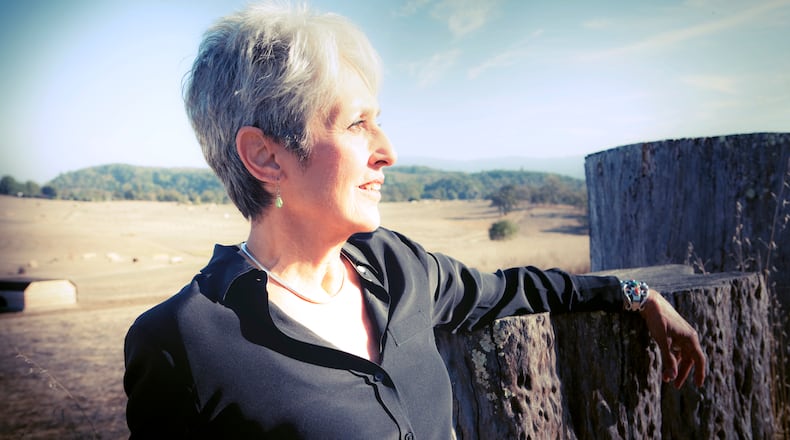In the background, a soft melody of chimes tinkles intermittently.
“Oh! Those are my Koshi bells,” Joan Baez says. “They were a present from a French promoter. I have them over the heater.”
Baez is talking from northern California home on a recent morning – hence the heater – as serene and reflective as one might expect.
The legendary folk singer-songwriter-activist is embarking on one more round of dates of her “Fare Thee Well” tour, which will visit Atlanta Symphony Hall on Friday.
At 78, she’s decided, like so many of her peers, that it’s the end of the concerts road after she plays several European festivals in July.
Some fans might have been surprised that her name was absent on the lineup for Woodstock 50 in August – Baez was a memorable contributor to the original – but that could change.
“I may end up there,” she says. “We’re still debating. My first reaction was no because you can’t repeat the original, but then I started thinking about it.”
In addition to a music career that is highlighted by her “Diamonds & Rust,” as well as interpretations of The Band’s “The Night They Drove Old Dixie Down,” the Civil Rights Movement anthem, “We Shall Overcome” and Bob Dylan’s “Forever Young” and “Farewell, Angelina” (among many others), Baez has been a dedicated solider to environmental causes and peaceful protests.
Unabashedly progressive, she discusses her concerns about global warming and the effect on younger generations. Baez is also an avid painter and is among the 100 semifinalists in the Outwin Boochever Portrait Competition at the National Portrait Gallery in Washington, D.C. with a painting of Marjory Stoneman Douglas High School student activist Emma Gonzalez.
During our conversation, she spoke openly and passionately about politics, this final tour, and her latest album, “Whistle Down the Wind.”
Q: You did an extensive run of shows in the fall. Did you extend the tour simply because there were cities you still wanted to play - like here - or do you feel like since this is the end of formal touring, you aren’t quite ready to leave?
A: We hadn't booked the South on the original tour and so much of my history is there. But (saying farewell) is weird and I would be silly if I thought I wouldn't grieve. A lot of it is relief. A lot of it has been fun. A lot of people come out. I get wistful, more about the band than the bus and the traveling. Then there are these incredible concerts, and everyone loves a full hall.
Q: So is this really goodbye?
A: It's looking like it. It really is the voice, which I love right now, but I won't be able to maintain it. If I were on tour and used it every day, it would last. But when I stop, I'm not gonna want to sit here in my kitchen and do vocalizing five hours a day. I remember when my mom was 92 and I said I was going to quit singing and she said, "What about your fans?" And when she turned 95 she said, "You've earned it, honey!" (Laughs)
Q: Tell me about the live show.
A: It's pretty simple. We have a lights man, a sound man. When we come out, I do a few songs and then a two-piece band comes out (multi-instrumentalist Dirk Powell and percussionist Gabriel Harris) and then at some point invite (Baez's assistant and co-singer) Grace (Stumberg) onstage. She literally fills in the high notes. I was lamenting I couldn't sing "Forever Young" anymore. We do a lot of inventing. If I want to do something from the new album, I'll work with Grace. There might be one frustrated person in the middle of the show who screams out an obscure song, but I know what they're going to yell anyway (laughs). How do you make new songs listener friendly? That's a challenge.
Q: You played Chastain a few years ago with the Indigo Girls. Do you know them well?
A: I've known them for years. When I started having opening acts, they were the first ones. They were my experiment! I've always felt most compatible with them.
Q: Activism has been such a huge part of your life, yet President Obama was the only time you endorsed a candidate. How hard is it for you to stay quiet now?
A: I do have to budge from my stiff positions about not talking about politics because we're in such a state. It isn't about Trump, but he's made it about Trump, and he's also convoluted the conservative party. It's so vile for them to think about a Hillary Clinton that they'll hang on to him. It's kind of like Hitler. You know the guy is cracked, but you still want to be one of his soldiers, so where do you go? Part of it is, we progressives never learned how to talk the way conservatives did in their think tank. They learned how to bully, and we're being bullied. It's wasting time. This is becoming more a fascist state than a democracy and the sooner we're able to say that, the sooner we can find the tools we need to dissemble it.
Q: This seems like a time ripe for political protest songs, but we’re not hearing many.
A: I think they're probably being written, but they're not as good as the ones in the '60s. You sit down and want to write a protest song and it's not easy. The thing they haven't been able to cross the bridge into is an anthem. There might be a lot of good songs, but we need the ones that will be adhesive, like "We Shall Overcome."
Q: “Whistle Down the Wind” is your first album in a decade and it was a relatively quick process to record.
A: (Laughs) The process was a year and half to find the songs! I don't pretend to do that work. Sometimes I find a song, like "Another World" and "The President Sang Amazing Grace," but for the most part (my manager) is doing the dirty work. He has a pile of songs waist high at his desk. If he thinks there is any possibility I'll like something, he'll listen another 50 times. When it comes to me, it's more difficult than it was years ago to reconstruct a song to my range. We worked for three days in studio. We have such brilliant musicians and they stand there with notepads and run through it once and I go in my little cubby and they go in theirs.
Q: You have songs on the album from Mary Chapin, Tom Waits, Joe Henry. What made those songs special?
A: I could manage them in my range. Tom is a fallback. I could go to any album and look at his repertoire and find something to sing. "The President Sang Amazing Grace" (by Zoe Mulford), I heard on the radio. Without that song and "Another World," it would be a pretty album, but it wouldn't have the depth that it has.
Q: You were inducted into the Rock and Roll Hall of Fame in 2017. What did that mean to you?
A: I'm kind of 'Eh, whatever" about awards, but with that one I did recognize my position in that rock and roll thing because it was transitional. I've had heavy rock and rollers come up to me all my life and say their music has influenced me. I was there when Dylan taught the Beatles how to smoke pot.
Q: You've lived an extraordinary and brave life. What do you want your legacy to be?
A: I can never really find the answer to that. It probably has to do with my son and having done what so many moms would like to do - come to terms with whatever was lacking in his childhood and unconditionally love him and support him.
Q: How do you plan to spend your time once this tour is over?
A: I paint, and I want to try to learn to slow down quick. As you get older and death looms in your face, it's wiser to have been able to meditate on it. I've had a small taste of what it's like (to be retired). In two months (after the tour ends), I won't be getting back on the bus, and yes, I'll spend some time in the garden.
CONCERT PREVIEW
Joan Baez
8 p.m. Friday. $39.50. Atlanta Symphony Hall, 1280 Peachtree St. NE, Atlanta. 1-800-745-3000, ticketmaster.com.
Follow the AJC Music Scene on Facebook and Twitter.
RELATED>> Concert review: Jackson Browne strips songs to their soul
Capricorn Studios will re-open in Macon this year
About the Author
Keep Reading
The Latest
Featured






